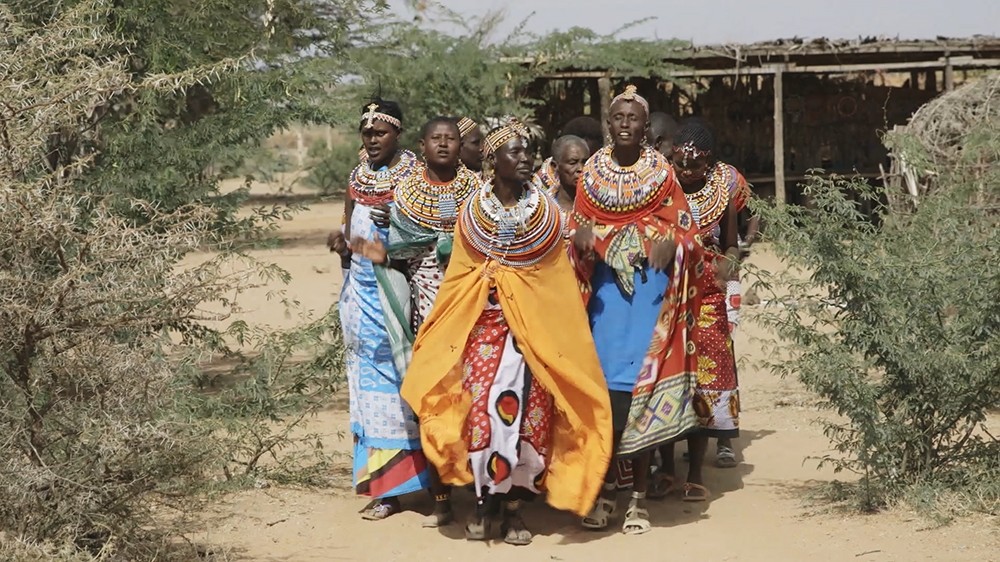Photo Courtesy of Aysar Al Khafaji
This Mother's Day, Aysar Al Khafaji, a refugee from Iraq, is taking her family on a trip from their home in Arizona to the exotic locale of Ohio. "We are having a family reunification," said Aysar, who will see her brother, nephews, and nieces for the first time in more than 13 years. "They came to the US from Libya three years ago and now we finally are getting to see them.""I got goosebumps when I heard we were going," said Taghreed, Aysar's 20-year-old daughter. "I haven't seen them since I was in second grade; we have so few memories, which is heartbreaking. But this Mother's Day we get to make new memories."
Watch: The Land of No Men: Inside Kenya's Women-Only Village
Along the way, the children had been taken out of school and Aysar and her husband were unable to work. "We were unable to support ourselves," said Aysar. "We didn't know where else to go in Iraq so we finally decided to flee the country to Jordan."The decision to leave Iraq did not guarantee safety. As the family traveled to Jordan, the bus they took was attacked by anti-government terrorists. "They shot at us," said Aysar, who nearly lost her son on that trip. After days of travel, they were able to safely cross the border.Once there, they learned they would not be able to stay in the country legally, but soon learned about aid groups like the United Nations working to help relocate refugees. "[Back] then, America was opening doors to accept refugees," said Aysar. After two years of waiting, she was informed that in two weeks, her family would be relocated to Arizona. "We knew nothing about the state, I didn't even know where it was on the map," Aysar explains. "We knew we would be starting from zero but that was okay because we were going to be safely together under one roof."At the IRC, Taghreed took courses helping her acclimate to American culture and was later awarded a competitive scholarship to a private school that prioritized her math and science education goals. Slowly, she was able to integrate herself into her new school and surroundings. Today, she is a studying biochemistry at Arizona State University and plans on applying to optometry school this summer.
Advertisement
The last time the extended family was all together was in 2005, in the midst of the Iraq war, when Aysar and her family were living in the capital city of Baghdad. There, Aysar and her husband provided for their family of five by operating an Arabic to English translation business that worked for the Iraqi government. But "2005 was the year things got worse," said Aysar. "Terrorists started to attack our neighborhood and the businesses slowly started to close."Shortly after the terrorist attacks in her neighborhood increased, Aysar and her husband were directly threatened because their ties with the pro-American Iraqi government made them—in the eyes of the anti-American terrorists—co-conspirators with the enemy. One day on his way to work, Aysar's husband Maher was kidnaped and nearly beaten to death by a group of armed men. They left him on the side of the road and warned him that next time, he would be shot.After that incident, Aysar's young son was nearly kidnapped, forcing Aysar to relocate her family to her sister's house in a nearby neighborhood. When her sister's house became unsafe, they moved to her parents' house. That, too, became unsafe.
Watch: The Land of No Men: Inside Kenya's Women-Only Village

Along the way, the children had been taken out of school and Aysar and her husband were unable to work. "We were unable to support ourselves," said Aysar. "We didn't know where else to go in Iraq so we finally decided to flee the country to Jordan."
Advertisement
"Everything we knew about America was from the movies. But once you get here, it's not like the movies," said Aysar. But with help from the International Rescue Committee (IRC), an international aid group helping refugees, Aysar says she became accustomed to Arizona's dry heat and America as a country. "I believe the system will serve you," said Aysar. "It's easy: go to work, work hard, support your family and help other people with their needs."For her daughter, Taghreed, things were a little more difficult. Middle school is awkward for most, but Taghreed wasn't able to communicate with any other students and didn't understand the new culture she had been transplanted into. "Not being able to make friends was a big deal," said Taghreed. "I wasn't also able to take the advanced math and science classes that I was able to take in Jordan."Wherever you go and whatever challenge you face, there will always be fear.
Advertisement
For many including Aysar and Taghreed, Trump's Muslim ban is not simply a memory of a failed executive order, but a reminder that they're living in an increasingly hostile anti-refugee climate. To those that find themselves surrounded by violence and persecution, Taghreed advises never to lose hope. "Wherever you go and whatever challenge you face, there will always be fear. I advise to any refugee or person seeking safety, to be persistent and to have hope," she said. "Just a small string of hope furthered our families dreams and allowed us to make the undreamable a reality."Aysar now works at the IRC's Phoenix office for their Child Watch Program, a service providing childcare to afford refugee mothers the time to pursue education and job training opportunities. She sees the effects of America's political climate even in her work with young children. "They all have relatives, they all ask when they are going to be able to come to [America]," she said. "I have to tell them to be patient just like they had to be patient before the came."While xenophobic rhetoric and policy seem to be at an all-time high, she still believes in the kindness of American people, having seen it firsthand. "People were so nice to us, people are still so nice to us," said Aysar. "Sometimes politics are politics. But Americans as a people overall are humanitarian people. They've lifted me up, they're helpful, passionate, and giving. Americans are Americans and they will continue to support other people."
